Zoë Marriott's Blog, page 5
November 22, 2021
The Plot Diamond, Part One: Turning Inspirations into Ideas

I started seriously trying to get published when I was sixteen. In the many (many) long years since then, I’ve written about fourteen or fifteen novels, all told, and had nine traditionally published and self-published one. I’m now working on my first adult novel as part of my doctorate.
Throughout all of this – on my firth and tenth book as much as my first – I have spent so much time worrying that I wasn’t doing it right. That I wasn’t building or visualising or carving out stories ‘properly’ and, as a result, my books just weren’t as good (as moving, affecting, dramatic, important, exciting etc.) as they ought to be.
I know I’m not alone. Here are some (paraphrased) quotes from emails and comments and in-person questions that I’ve had over the years:
How do you actually turn an idea into a real story?
How do you ever figure out what happens next?
How do you fill a whole book up with all that STUFF?
How do you manage to keep going through all those thousands of words?
How do you know you can get it right?
Plagued by these worries, some writers plunge into drafts with huge enthusiasm and get horribly, time-consumingly stuck as soon as they hit what’s often called ‘the middle muddle’. Some write a whole novel’s worth of ‘bad’ words before they can really understand or articulate what story they’re trying to tell, and then throw everything out and start again for their official Draft 1 (they call this ‘zero drafting’; personally I think I’d rather jump down a mineshaft). Some plan exhaustively and then find everything veers wildly off track – others fly by the seat of their pants and agonise over what is to happen in each and every scene as they write it.
For me, this sense of ‘incorrectness’ usually manifests in struggling to begin. I find the first five to ten chapters of anything paralysingly painful to get through. The characters are in the right location, they have the traits I’ve designed for them and the relationships with each other that I’ve envisaged, and they’re aimed squarely at the jobs that I need them to do, but they – aren’t alive. They’re wooden figures jerkily clip-clopping across a hollow-sounding stage, flatly repeating the lines I’ve written. The second that I stop concentrating on making them move, they fall down.
Astute readers will have skimmed over the above wails of despair about my writing misery with eyebrows raised, mentally commenting that clearly I figured out some way to overcome these issues, or else I wouldn’t have kept on churning books out on a fairly regular basis over the past decade. And they are correct. I – in common with most writers, I think – have developed a plethora of tools to try and get me through that terrible ‘I’m-not-doing-it-right-I’m-a-terrible-writer-and-soon-the-world-will-find-me-out’ stage as quickly as possible and minimise the amount of wear on my poor tooth enamel.
I’m going to talk at some length about one of those tools here, and probably over another post as well; you can infer that this is something that has worked for me. Therefore, it is something that may also work for you. But it has limitations, probably more than I’ve ever really considered until lately, and I’ll also talk about those as we go.
“Yes, yes, get on with it,” you say – but wait.
You need to understand the limitations so that they don’t end up limiting you. Or the stories that you want to tell, which may not fit this method at all, and in fact, might be distorted and ruined by attempting to make them fit. This is just a way of thinking about stories, not a universal cheat code. There is no universal, Platonic artist – or work of art – and so there is not and can never be a method that works for every artist – or every piece of art. Have your pinch of salt at the ready and apply it at will.
My idea - not a unique one - is that for most writers, stories emerge piecemeal. We have a variety of little idea fragments spinning around in our heads at all times (for instance: an interest in the facts about Huguenot artisans arriving in London as religious refugees in the 1600s. A certain tone or atmosphere in a book that you once liked. A plot twist that was completely wasted in a TV show you did not like. The desire to one day name a female character ‘Nell’. Memories of watching a weaver work at a historical enactment site). On a certain day, two or three or more of these collide, or collide with some other thing that you were randomly thinking about and suddenly there's a story there.
But it's not a complete story.
It does, in that blinding light of inspiration, often feel like one. But while the fact that you clearly envision a fearless female hero fighting a black-clad Samurai in the middle of a bleak orange desert could mean that you want to write a breathless adventure with a female lead, it could also mean that you want to write a Dystopian road novel from the point of view of a lonely Samurai who wanders the world searching for love but ends up destroying it when he finds it. Or that you're interested in having a romance where the couple fights each other with swords. The important thing could be the tiny snatch of dialogue you get where they taunt each other about their parents, or the colour and slithering drifting quality of the sand under the sun, or the general bleak tone of the thing. It might be that this scene will never end up in your book, and that neither the female hero, Samurai, or the desert are even the important part.
Ultimately the much vaunted burst of inspiration usually leaves you with surprisingly little: let’s say, an idea for an opening scene or inciting incident, perhaps a couple of middle moments, and an inkling of an ending. And that’s if you’re lucky! The unlucky part is that none of these things link up and you have no idea how to get from one to another.
This is where I bring out the Plot Diamond (cue: dramatic clash of thunder, flickering lights, thin, distant scream).

Once again, certain readers are giving me the eyebrow. “This,” they would point out, “looks rather reminiscent of…”
It does indeed resemble Aristotle’s Theory of Drama, and Freytag’s Pyramid. It’s also heavily inspired by Christopher Vogler’s The Writer’s Journey, which itself borrowed heavily from Joseph Campbell’s work The Hero with a Thousand Faces. You can also see echoes of Shakespeare’s five act structure and even the famous cinematic three act structure popularised by Blake Synder’s Save the Cat. What a lovely pedigree there. Clearly this means that the Plot Diamond is a universal cheat code for writing, yes?
No. Look again at this list of illustrious names and note the thing they all have in common: they are all white males writing within the Western tradition of storytelling. This story is, at the basic level The Hero’s Journey. And the Hero’s journey is founded on a world view and culture which is deeply patriarchal and Imperialistic. Who leaves his ancestral land with a band of fellows on the advice of his elders, goes out into the scary world to fight and kill and learn lessons, then drags his booty (dead woolly mammoth, chest of treasure, the Secret Elixir, the effective ownership of another nation and its people) back to his home where his family and elders are waiting to be impressed by his deeds? The secret is in the name: the hero does.
Who is a hero in such stories? He's able-bodied, he's cis and straight, he's almost certainly white or at least Western, or in the racial/ethnic majority of his people. He might be a woodcutter's son, but his quest will usually reveal him to be Of The Stuff Of Kings. And he's obviously male. Just for example, his sister didn’t get to leave on a merry adventure, learn lots of exciting life lessons, and then come back to her ancestral lands, did she? No, no, what if she had sex and 'ruined' herself out there? If she did leave, it would only be so that she could be married off into a different family. A one-way journey; a straight line rather than a circle or a diamond or a triangle. The journeys of Snow White and Beauty, Ariadne and Psyche, Becky Sharp and Jane Eyre, and most of our traditional female literary heroines have a similar one-way structure.
Narratives do not have to work like the hero’s journey. Really. Some of my favourite books definitely don’t. Oh, you can force them to look like they do, if you are obsessed with making all stories the same. I’ve seen people do it. I’ve seen people criticise deeply effective and moving books and films because, despite being wonderful, they didn’t conform to this structure. That is entirely backwards way on, and I will one day talk in more depth about that as well, but suffice it to say that whatever complex jiggery pokery we writers get up to in our heads (or notebooks) in order to organise our narratives, this process must always be in service of creating the most effective work possible.
There is no Ultimate Form of a novel to which we should all aspire. There is no universal cheat code.
Do not try to force your story to take on any form, especially if the process hurts you or it! Please. I recommend a read of Jane Allison’s wonderful book Meander, Spiral, Explode, or this absolutely joyous essay by Rebecca Solnit which conclusively proves that trees are socialist, at least according to Ted Lasso (trust me, it all make sense somehow).
However, in the meantime… well, a lot of us were raised steeped in stories that do follow the hero’s journey. It often feels intuitively right to us. Thus, the good old Plot Diamond does work for quite a lot of people and stories. Used with acknowledgement of its limitations, it can be a very helpful device for organising ideas into something that, at the very least, feels like a story.
So next week I shall go through how to use the Plot Diamond and what it can do for you. I hope to see you then. In the meantime, please do join me on Thursday for Pick & Mix and some writing joy, which I definitely need a dose of just now!

November 17, 2021
Thursday Pick & Mix (#2)

Welcome to the second Thursday Pick & Mix challenge. How did things go for you last week? Did you find your imagination freed, and scribble happily for the full ten minutes? Or did you stare at the various prompts, feel under an inexplicable amount of pressure, panic, and go off to clean the kitchen instead?
Please don't worry if it was the second one. I had this reaction a couple of times when I was starting, and I think it ultimately came back to that sense of being expected to write once again, to produce words, to be creative on demand.
If you still want to take part, it might help to remember that no one, not even you, ever has to read these words. The point is not to spontaneously produce a heart-breaking work of staggering genius, just like that. It doesn't matter what you write, and it doesn't matter if it's 'good' by anyone else's measure. The idea is literally just to have a fun and joyful ten minutes of writing. Be silly, if that helps. Interpret the prompt or prompts you've chosen in the most ridiculous, far-fetched way possible.
And promise yourself that you will follow the few rules I've laid down:
Use any mixture of the prompts that you like. One of them, two, all three - even none (you maverick, you). Write for ten minutes. Ten. No more and no less. If you're the type who anxiously watches the clock or checks her watch (like me) then set a timer and put it out of sight but in earshot. Don't edit or revise what you're writing while you are writing. Just don't. If writing longhand, put your palm or a piece of paper over the lines as you scribble them. If writing onscreen, set the font to the same colour as the page so that it's invisible. So what if you make typos or spelling mistakes? It doesn't matter! Laugh at them and keep going. Once your ten minutes are up, please, please give yourself the grace of walking away. Don't read what you've written straight away. Leave it as long as you can - long enough that you might remember it with a little start of surprise and pleasure and go back to it in a spirit of curiosity without expectation - or may even feel that need to read it, judge it, evaluate it for it's worth and try to 'fix' it, evaporate entirely. If no one ever reads your ten minute scribbles, it doesn't matter one tiny single bit.With that out of the way, I think we're ready to begin.
MUSIC
WORDS
"Jubilations of darkness."
Get writing. I wish you joy.
November 14, 2021
Variations on a Theme

I spend an awful lot of time thinking about theme.
I didn't always - or at least, I didn't consider it in those terms. I think my pre-occupation with the topic developed as a side effect of my work as a Royal Literary Fund Fellow. For clarity's sake, an RLF Fellow is a professional writer (of 'established merit', which is always nice to hear about yourself) who is employed by the venerable Royal Literary Fund to go into universities and teach writing skills to students ranging from BA to PhD level.
Many RLF Fellows have no teaching qualifications; I didn't. Many have no formal qualifications at all: at the time of my Fellowship, I didn't. What they do have is a fantastic grasp of how to use the English language to make a point, how to employ all the tools of lucid and persuasive writing to convey information and construct a convincing argument. We also know, at a basic level, how to construct a grammatical sentence, how to use a semi-colon correctly, and the difference between an appropriate synonym and one which makes an entire paragraph unintentionally hilarious. Believe me, these last three were skills which many students who came to my office definitely benefitted from learning.
But I would say that the vast majority of the students who visited me were actually perfectly competent writers. Their issue was that no one had ever taught them what an essay was actually for.
The most vital turning point of many sessions was my introduction of the topic of ‘thesis’ or ‘argument’ – or, to put it in plainer terms, the moment when I bluntly asked my students: ‘What exactly are you trying to say with this piece of writing?’.
I'll be honest: I received so many blank, faintly panicked stares in response to this simple question that it was a little disheartening.
However, once the students understood that the point of an essay was not simply to produce two or five or ten thousand words describing a subject area, but to actually express an opinion – in academic language, and backed up by meticulous evidence and references, of course – I could see that lightbulb click on. This is the difference between writing about WHAT a thing is and examining WHY it is, and HOW. Which is about one hundred times more interesting.
Having said all this: don't you think it's rather strange that novelists are so often discouraged from undergoing the same questioning process in their work?
The idea – a relatively modern one, perhaps a product of New Criticism’s desire to divorce authorial intent from the reader’s engagement with a work – seems to be that ‘having a message’ or ‘wanting to say something’ is preachy, cheesy, old-fashioned and just generally a detriment to the development of great art. As if thinking about topic or theme or argument too much would be bound to produce something akin to one of those Victorian Morality Tales for small children, which usually ended with Little Mary being devoured by bears or stricken with typhoid because she wouldn’t wash behind her ears (and a strong implication that it served her right).
But theme still stubbornly comes up, doesn't it?
In query letters to agents, at pitch meetings with editors, while devising a ‘shout line’ for a book’s cover, or trying to describe our work for someone we meet in the kitchen at a party, we're always struggling in some sense to articulate what exactly our narratives are about.
One thing I notice writers doing pretty often is to attempt to avoid the cheesiness factor by boiling everything down to a single word: "Oh, well, it's really about war, you know." It's what? Is it really? Well, I mean, if you say so... I've heard people say that they were writing about divorce, trauma, identity; death. Concepts so massive and intangible that they might as well have said: "I am writing about blue."
(No offense, of course, to Kai Kupferschmidt).
I think some of this reluctance to dig meaningfully into meaning is caused by a conflation of the notion of theme with that of the (much hated and feared) elevator pitch, in which authors describe their work by reducing all their blood-and-sweat-stained lyricism down to something as bland as possible in order to appeal to the widest audience. Jaws meets Memoirs of a Geisha. The Count of Monte Christo crossed with Independence Day. The Wars of the Roses – in space! No one wants to elevator pitch their new friend in the kitchen at a party. No one wants to sound as if they're imparting moral maxims, either.
What's either funny or tragic, depending on how you look at it, is that none of the things I’ve mentioned above – not the desperately blunt single word or the elevator pitch, or the preachy, cheesy, moral sentiment – actually constitutes a theme at all. Or at least, not as I understand the concept.
We’d all probably be better off using the same sorts of words that I utilised to teach my students: Thesis. Argument. What are you trying to say?
What story are you hoping to tell?
If you want to understand your story’s theme, ask yourself: what central ideas do the events of my story effectively illustrate? What argument do my characters’ own words, values, and choices prove ‘true’ within the narrative? What sorts of actions are consistently rewarded within this work – and which types of people are ultimately shown to be foolish, weak, misguided, mistaken, or even villainous?
This is the point where it gets tricky, isn't it? Are you feeling a little flush in your cheeks, a faint swelling beneath the breastbone, a troubling sense of defensive confusion, and the desire to stop thinking about this and go and do the washing up instead? If you’re honest with yourself – I mean, really honest – is it possible that your work is definitely ‘saying something’ after all? Something you never meant it to?
All too often writers are horrified and trip quickly into denial when accused by readers of authoring a work with a central or side theme of, for instance, ‘fat people are worthless’ or ‘ambitious women cause disasters’. “I didn’t write that!” we cry, clutching our metaphorical pearls in horror. “You’re reading things into the text that aren’t there!”
But if the only fat person in your book (or every fat person in your book) makes very stupid decisions and is punished for them by your story, or the only (or every) woman who is depicted working ambitiously eventually comes to a sticky end? Well, it may not have been what you meant to say, but as I told my students, what you meant to say isn’t necessarily what you actually committed to the page.
Sometimes, just as with that time someone congratulated me on losing so much weight and then clearly wished they could sink through the floor when when I muttered that I hadn't been eating much since my father's funeral, we express hurtful sentiments without ever intending to.
This is why, personally, I find writing much easier and more satisfying if I throw off the shackles of theme-shame and confront my own intentions, not only before I begin drafting, but throughout my whole process. I set my characters around me, consider the setting and tone, the plot events I want to explore, and ask myself: ‘What story am I trying to tell here?’ This questioning progresses, through: ‘Am I telling that story with this scene or character revelation?’ to: ‘If my character makes that choice, how can I illustrate my theme through the consequences?’
Sometimes I set out to write a story encompassing one theme, and find as I write that the characters and world are actually pulling me in another direction. This is thrilling, but also frustrating, not only because it often means a lot of work rewriting and re-outlining, but also because my characters and world are in my head, and therefore I feel it would have been polite if my own brain had let me know what was going on back there. Consciously. Before I wrote ten chapters that are now plainly wrong wrong wrong. However, I don't quibble with this kind of revelation anymore. Some of my greatest disappointments with myself as a writer stem from ignoring my own sense of the greater story I ought to tell in favour of something smaller, more convenient and more manageable.
I’ve written a novel with the central theme ‘Compassion is beauty’ (Barefoot on the Wind), one with a theme of ‘Freedom is more important than power’ (The Book of Snow & Silence), one with the theme ‘You are not to blame for the things that have hurt you’ (Shadows on the Moon). I believe in all these ideas, and very much enjoyed putting my characters’ through the ringer until they eventually gave in and learned to live by them.
And yet... (I'm making an agonised face, crinkled brow, gritted teeth, as I admit this) I know that it’s not so simple. As I said, I’ve been thinking about theme a lot, and lately I've been thinking about it in new ways.
Some academics, for instance, spend their entire careers writing dozens of different books and papers on topics branching out from their main area of study – but always, usually, to illustrate one central idea. They might examine themes of class and race in Tudor plays with one monograph, staging and authenticity with another, and argue for a radical reinterpretation of Shakespeare’s Sonnets in the next. But ultimately they’re always asking for their readers to believe some central tenant: perhaps that Shakespeare was really the Earl of Oxford. Or that he was a radical liberal, hiding sedition in his works. Or that he was actually fifteen underpaid jobbing writers scribbling madly in a basement.
Are novelists the same? The more I think about the themes which have informed the various individual novels of my own career, the more I begin to realise that each of these theses – powerful and worthy as they are – are more like paragraphs in an essay, each building up towards proving some greater thesis. One which, contrary to everything I’ve said so far, probably boils down to a single word after all, and is something I never consciously chose at all.
I’m not sure what I would call that theme. Forgiveness? No. Redemption? Not quite. Perhaps, simply, compassion.
The idea of compassion – of the vital importance of compassion in making any life bearable, and how damaging the lack of it can be not only to those who seek it, but those who choose to withhold it – seems innate to everything I write. A part of my identity as a creative person that I cannot change no matter how much I change the type of stories I tell, or the worlds, or the characters. In much the same way that I have a shouting-at-my-dog voice, a singing voice, a teaching voice, a speaking in public voice – but ultimately they are all recognisably my voice, even if I should try to disguise it – my theme as a writer seems to have been set for me by the same forces which gave me green eyes, asthma, and wobbly ankles.
I wonder if this is why a lot of writers don’t recognise the other themes that readers and critics attach to their work, even when these seem profound and important; deep down they know that they’ve always been working on proving something else. Perhaps every writer is ultimately embroiled in an eternal argument with the universe, an argument which grows and twists and turns as they mature, but which springs naturally from their identity as a person and an artist.
A thesis which can only be fully proved by devoting a lifetime to variations on the theme.

November 10, 2021
Thursday Pick & Mix (#1)

Why do writers write?
The answer, of course, is as varied and diverse as the writing community itself. Many writers say that they don't actually enjoy writing, but only - as Dorothy Parker famously admitted - having written.
However, I'm willing to bet that somewhere eons ago in the mists of yesterday most people first put pen to notebook, fingertip to typewriter key, or crayon to bedroom wall, because they did find pleasure in some aspect of the writing process. Something about writing attracted them. Drew them in. Hooked them. Perhaps it was telling themselves a story, imagining and building a world. Playing with the sounds or look or rhythms of words. Creating and developing characters. Describing things in lush and sensory detail (a personal favourite). Or maybe just the meditative repetitive motion of typing or moving the freshly sharpened pencil across a page.
What most writers also have in common is that, the more time and effort we invest in becoming better at our craft, the more we look for external markers of success such as academic qualifications, publication, sales or commissions. And the more we care about what other people think of our work (necessarily!) the further we distance ourselves from that first pure spark of joy that motivated us to give the reins over to our imagination and start making things up in the first place.
Early in 2021 I found myself in what my mother would refer to, delicately, as 'a state'. In the middle of doing some yoga (an attempt to destress) I broke down, and literally ended up curled in a ball on the floor, weeping like a child. Why? Because I didn't want to write. You might feel this was an over-reaction, but I'm not talking about an ordinary day of laziness, reluctance to grind through a tedious but necessary bit of exposition or tackle a stubborn plot hole, or resist my favourite author's new book waiting tantalizingly on my ereader. I mean that every time I tried sit down and work, I was miserable. I hated it. I couldn't push through it.
Oh, I could force myself to produce a few paragraphs here and there, a couple of new pages a week. But not only were they the kind of rotten, empty words that served no purpose in moving my work forward (and I couldn't even tell myself that they could be edited and fixed later because they were all-too-obviously pointless) but making myself do it made my misery worse. It got to the point where just the sight of one of my notebooks or the familiar Word logo - even going into my study to dust and vaccuum - was enough to fill me with a visceral kind of revulsion and anxiety. I didn't want to write, and quite frankly it felt as if I would never want to write. A single word, ever again.
Since my childhood, making up stories and then figuring out the best way to tell them had been my whole identity. Through sixteen hard-scrabble years as a professional writer and occasional writing teacher, through chronic illness and personal strife, through financial stress and even the death of my beloved father, disappearing into words was my refuge. My safe place. During that dark January, for the first time in my life, my refuge had locked its doors against me. Safety was gone.In the void left behind, fear and insecurity expanded like an airbag until I barely felt that I could breathe. And of course, writing was my coping stategy for fear and insecurity. What was I supposed to do when writing itself suddenly caused me fear and insecurity? Apart from locking myself into the dark, cobweb draped cupboard under the stairs and laughing like the echo of someone's murdered hopes until I died and could then impart my misery to the next ten generations of people who dared move into my house after me... no ideas presented.
Kind and well-meaning friends advised me that I was probably just burned out. I needed a break. I should take up some other hobby, find comfort and refuge some other way. And I did try. I didn't really have a choice. I bought modelling clay and other art supplies, I gave myself permission to catch up on all those Netflix shows in my list, I read popcorn books and re-read old favourites. I increased my yoga to every single day and took up HIIT training too, and got ambitious with my cooking. The end result? When I ran out of displacement activities I was still miserable, afraid and insecure, and now none of my shirts would fit over my new biceps. Dammit.
Rather than force on you a detailed account of the fevered and desperate contortions that came next, I'll skip to the Big Realisation: of course, the problem was that I had lost my joy.
Which is to say that I had lost touch with my ability to find pleasure in writing itself, the writing process, the meditative movement of pencil across page - rather than having written. Being a professional writer for so long, then writing for my MA, and finally writing approximately one thousand slightly different thesis proposals for different University English departments (Thesis Prop Draft, Thesis Prop Draft 2-8, Final Thesis Prop, Final Thesis Prop 1, The Final Thesis Prop, New Thesis Prop, New Thesis Prop 1) had brought me to a place where my brain was engraved with the knowledge that no matter what was happening in my life, no matter what I was going through physically or emotionally or how I felt about the words I was producing, I had to write. And write and write. And write some more. Not because it brought me any pleasure whatsoever: because it was my job. What did joy have to do with it? Drop and give me 2000 words young lady and they had better be formatted to industry standard and employ the semicolon correctly!
The cure for this - the cure that brought me back to joy - was to disconnect writing from results once more. To travel back through those mists of yesterday to that small child I once was, hiding in the tiny cubbyhole formed by the bunkbeds in my childhood room and scribbling on scraps of paper until the pen ran out or I figured out how to end this epic tale of a pig and a rabbit and their tea party, and every single delicious thing that they ate at their tea party, whichever came first. To write without caring what form it took, what purpose it served, if it was any good in anyone else's eyes, or even if I finished it. Just because it was fun.
For me, this took (and still takes) the form of an absolute boatload of extremely weird experimental freeverse, some killer openings to novels or short stories (who knows?) in various random or perhaps even nonexistent genres that I am not remotely bothered about ever creating an actual plot for or attempting to finish, and some self-reflective journal work that has actually, genuinely helped me experience some flashes of what I think they might call... 'peace'?
And so I bring to you, my new blog readers, a feature I am going to call Thursday Pick & Mix because (as I believe we have conclusively established) I can occasionally display the same mental age as the little girl who created that undiscovered masterpiece 'Pig & Rabbit's Tea Party'. And that isn't a bad thing.
This is a creativity kickstart, and by design it's really simple. I will give you three prompts for writing - though they can of course be used as inspiration for any creative work. One will be an image from my Pinterest board, one a link to a piece of music, and one a word, or line of poetry or prose. You may chose one of these, two of these, or combine all of these together - go wild. Who am I to tell you what to do?
Well, except to say that having accepted the Thursday Pick & Mix challenge, the idea is to take whatever little spark of joy sprang to life for you from looking at these random prompts and write (or sculpt or make nail-art or perform interpretive dance) for no more than ten, count them TEN minutes without stopping, self-editing or or second-guessing.
If you write long-hand, maybe have a loose piece of paper to draw down the page after you finish each line. If you type, you could set your font to match the page colour, making it invisible. But don't look. Writing is what you're doing, not reading, definitely not editing. And then, having written madly and joyfully for those ten minutes... walk away.
This part will be the hardest. Of course you're going to want to see what you've written, to see if it's really as good, bad, weird or intriguing as you thought. To see if it should be rewritten, improved, continued. But that is exactly the opposite of the point of the exercise. The point is just to enjoy the doing of it.
So walk away. Leave it for an hour or a couple of hours or a day or a couple of days. Whenever the burning need to look at it - to evaluate it for worth - is so far gone that you remember the unread work with a little start of surprise and pleasure, then you can go back and laugh or grimace or even say 'Hey, I could make that into a decent poem...' And if you decide, after an hour or a day, that you don't need to look at it at all, that's also fine.
This is the way that I, day by day, re-discovered the spark of joy that initially hooked me on writing. Playing with words, imagery and description, trying to encompass huge or tiny ideas on the page just for myself in that moment without any thought of past or future. So if you, too, feel that you may have lost track of joy in your writing practise? I invite you to take part in Thursday Pix and Mix. And if you'd like to talk about your experiences with this - how your ten minutes went, what you struggled with during it, if you gave in and peeked or how it felt not to peek - in the comments, I promise to read and respond non-judgementally to anything you might say.
Now, without further ado... this week's Pix and Mix.
MUSIC
WORDS
"The wind rolled over the deck with a low, wavering moan, bringing salt spray to sting my face..."
Get writing. I wish you joy.
November 6, 2021
New Blog - who's this?

Hi. I’m Zoë. For fifteen years I made my living by writing books for young adults, and running creative writing and reading workshops in schools and libraries, mixed in with a sprinkling of book festivals and other bookish events.
But I’m not doing that job anymore.
Don’t misunderstand: I’m proud of the work I did as a children’s writer. I poured out my heart and every bit of talent and skill that I had into making books that were diverse, Feminist, nuanced and inclusive. Back when my early books came out, ‘diversity’ wasn’t even a phrase in mainstream discussion about media yet; my publisher labelled my work ‘multicultural fantasy’. I had to fight to include trans and queer characters, disabled and neuro-atypical characters, and get characters of colour accurately represented in my cover art.
I loved working with kids, trying to help them keep their connection to creativity when, very often, they’d had their natural desire to make up songs and poems and stories shamed out of them by adult authority figures telling them ‘Don’t daydream!’ and ‘Sit still and pay attention!’ and ‘Don’t make up silly stories!’ Sometimes it was an incredibly stressful and even thankless job, but at others I felt like I was living the dream. No matter what, I always loved it.
But for years and years I had dream so secret – so seemingly unattainable – that it was mostly hidden even from me. I wanted to write books for adults. I wanted to teach adults creative writing. It was silly though; I knew it was never going to happen.
Why was this ambition so far out of my reach?
From the day that my mother – sick of the overactive imagination that caused night terrors and ruined my family’s sleep for weeks at a time – shoved a battered old Enid Blyton book into my hands and told me to read when I was scared at night, I wanted to be a writer. This was a tall order for a working class girl from a council estate in one of the most socio-economically deprived areas in the country. My parents had grown up in homes without indoor bathrooms. They both left school at fifteen. No one in my family had ever even attended university, let alone graduated with a degree. Who was I to think that I could actually be a published author – that anyone would ever want to hear, let alone read, what I wanted to say? And that was before you took into account the chronic illnesses that amounted to a life-altering disability, and the fact that I was just figuring out there was something, well, a bit different about my sexuality...
Luckily, I was blessed with the one attribute that is indispensible to all writers: a stubbornness so profound that it rivalled that of any donkey in the land. If people were going to look down on me, bully me, sneer at me, tell me to sit nicely in the corner and be quiet? Well, I would just damn well show them, wouldn’t I? I worked with a single-mindedness that frankly awes me, looking back, and that stubbornness was repaid. By the age of twenty-two I had been rejected by every British publisher of children's fiction (and two in Australia) at least once... but I had my first book contract under my belt.
One of the things that I let drop in my all-consuming quest for publication was education. Like many ‘bright’ working class girls, it was made clear to me by every adult authority figure I knew that, if I were fortunate enough to avoid getting pregnant as a teenager, the peak of achievement for me going forward would be to attend the local university and become a teacher. Probably an English teacher, since I wasn’t quite ‘bright’ enough for maths. I needed to have reasonable expectations of life, after all.
This de facto life-plan was clearly not going to aid me in my quest to become a writer, but I dutifully went along with it, enduring a year at sixth form college where I experienced even more bullying, sneering, and demands that I sit nicely in the corner and stay quiet, mainly from the overwhelmingly middle-class kids in my classes. Then an assault by a male classmate landed me in the hospital. I was used to physical bullying, and so were my family. It didn’t occur to us that we ought to contact the police (although I do wonder why the college didn’t).
When I came back to the college two weeks later, the male classmate and his friends had spread their version of events (I’d started it, I’d been asking for it, I’d over-reacted, I’d only been trying to cause trouble for the poor innocent boy) and the rest of the student body, with a few kind exceptions, responded by sending me to Coventry.
That was it – I’d had enough. I shook the dust of the college from my feet, found a job, and kept writing. It took years to understand that what had happened to me wasn’t normal, or OK, and the way I’d been treated was actually messed up. But I refused to let it bother me because I'd done it, in the end. I’d become a published author, and a full-time author within three years of that. I’d shown them, hadn't I? What did it matter that I'd dropped out without finishing my A-levels? Why should I care?
Except, of course, that I did.
Despite publishing ten books for young adults and making a living at my craft, I had a constant, nagging sense that I’d missed out on something I hadn’t even realised was important, until it was too late. That an opportunity to learn, to add richness and depth to my knowledge, had slipped through my fingers. A kind of freedom, the ability to choose, was lost to me. People who read my writing blog – which was aimed at young readers – and my long, analytical posts about the craft of writing there urged me to look into returning to education. But it was impossible. Impossible. Wasn’t it?
In 2017 I was made the Royal Literary Fund fellow at York St. John University. It was wonderful. I adored teaching in that setting, and despite not having done any academic writing for over a decade, and never having done it at degree level, I turned out to be really good at helping others with theirs. Talking to the students, whether they were doing a BA in physiotherapy or a PhD in marketing, and spending time with the other staff members, showed me that closing the door on A-levels at seventeen didn’t necessarily mean the door to education was barred and locked against me forever. So in 2019 after the Fellowship ended, I took the plunge. Despite rampant insecurity and the lack of any qualification more advanced than GCSEs, I enrolled for a Master's Degree in Creative Writing at Kingston University.
Some pretty knowlegable friends warned me against this move. A Master’s Degree, for someone who’d made a living as a professional writer? The course wasn’t meant for people like me! I would be bored senseless, frustrated beyond belief. It would be too slow for me. It would be too academic for me. It would crush my spirit. I ignored them, and in a not-at-all surprising twist, I found that they were wrong. I loved doing my MA as well. I loved the reading, the essays, geeking out with fellow students, workshopping and offering feedback, being challenged to try completely new mediums and genres... I even enjoyed learning to cite references correctly and compile a bibliography (in a strange way). By the time the course was over, I was finally able to admit, to myself and others, that secret dream: to write for adults and teach creative writing in a Higher Education setting.
Academia was where I wanted and needed to be.
And for that, I needed to set my eye on a new goal: a PhD.
I think I’ll skip swiftly over the process of actually getting to pursue my doctorate because it was long. Long and arduous. Much more messy and complex than the short summary above makes it sound. I will probably go into it in more detail in another post, if anyone is interested in that or would find it useful. For now I’ll just say that it took a hefty dose of resourcefulness and energy (and stubbornness) but eventually I was able to win a place and funding to study for my doctorate in Creative Writing at the Open University. I’ve just started. Just now – this October. If you can't believe I managed this, well, join the club. I still occasionally have to pinch my own arm.
And so, this new blog of mine. I wanted to chart my journey to my PhD, to talk about the work that lights me up with passion, enthusiasm and occasionally rage, and the process of learning about the academy as an outsider and a mature student. My old blog, The Zoë-Trope, was aimed at younger readers for my books, and has been on hiatus for over a year besides. So I decided it would be symbolically and practically appropriate to start anew.
This blog's title comes from a line in Rossetti's poem ‘Sudden Light’, which refers to “Time's eddying flight”. The poem is central to my research project, but it's very meaningful to me personally, too, and in my mind Rossetti's eddying flight has come to represent not only the characters' arcs within my novel, but also the exciting, terrifying and non-linear journey to achieving my doctorate and, hopefully, a place in academia.
An Eddying Flight is for creative writers and creative writing teachers, for authors both published and working-on-it, for budding academics and for more seasoned post-graduate researchers, and anyone who is interested in academia, the journey to PhD, or writing craft and creativity.
This is my invitation to you, Dear Readers, to join me on my eddying flight.

December 28, 2020
GET THE BOOK OF SNOW & SILENCE FREE!
Hello, Dear Readers - happy Monday! I hope that those of you who celebrate it were able to have a relaxing or fun Christmas despite it being The Hell Year, and that everyone is doing OK out there.
Just a quick update today, but I hope a good one. As a fun way of celebrating our getting to the end of The Hell Year - and 2021 hopefully being marginally better, please Lord Cthulhu, please - I decided to offer up a treat: the ebook edition of The Book of Snow & Silence will be free to download from today for the next four days. That an international offer: it's good wherever you live.
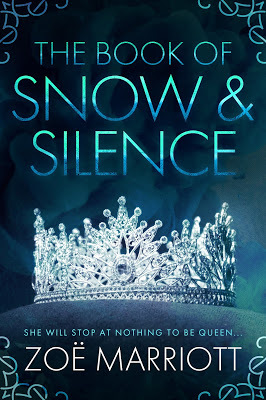
So if you're in the mood for snow bears, ice palaces, ballgowns, and princesses and mermaids who fall madly in love, and you've been wanting to grab the book but haven't yet? Now is the time.
Here's the book's official playlist:
Happy upcoming New (Slightly Less Awful) Year!
October 16, 2020
PREPTOBER, PODCASTS AND PROUDNESS (oh my!)
Hello, lovely Readers! A quick October check-in for you today - or Preptober, actually.
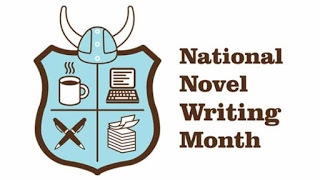
Yes, you read that right. Following the successful completion of CampNaNo this year, I've decided to defy the NaNoCurse - and perhaps common sense - by giving NaNoWriMo a shot again this year. This will be the third time that I've attempted NaNo proper and both previous times I ended up both hurting myself and getting ill in the first few days of November. But a) third time lucky, maybe? and b) what is life without the spice of risk? And since I've basically had to put the draft of the Most Special Secret Project Ever on hold for the last few months while I was teaching, working on my dissertation, and finishing up other projects, this seems like a really good cue to dive back into it.
I've signed up as a NaNo rebel this year, since I've already got a detailed outline and have drafted out a chunk of chapters/scenes of the MSSPE. For me, Preptober is more about diving back into research (of which there is... a lot. A lot. A. LOT), re-reading the scenes I've already got, and re-familiarising myself with the characters and tone of this story. Which I love so much, you guys. My gizzards are knotted with hope that this one finds a home when it's done.
Now, for Dear Readers who are into podcasts, there's a really fascinating interview here between me and the absolutely lovely Amanda Whittington as part of the RLF Writers Aloud series. We talk in depth about my books, about Feminism and diversity, and about publishing, in addition to a bunch of other random topics. I had so much fun recording this with Amanda, and really enjoyed listening to it again when it went live, so check it out.
Finally, you might have noticed that above I mentioned working on my dissertation - and some of you may already know that I was scheduled to complete my Master's Degree in creative writing this year. This is a huge deal for me because... well, because I'm not from a family where people were expected to go to uni, or get degrees, especially advanced degrees. There's a post about my opinions and experiences with education here for context. Very luckily, considering that this is the Year of Our Lord Cthulhu of Unending Horrors, I had opted to take the course by distance learning, which meant that it wasn't substantially affected by the pandemic as all the work was set and handed in online anyway.
I handed in my dissertation - which is the final, and most substantial piece of work the course requires - in August, and the (provisional - they're still waiting for review) marks came yesterday. When the email arrived in my inbox I almost couldn't make myself open it because I was so sick with nerves about the outcome, with all my fears about education not being for 'people like me' flooding back in. But when I did open it, I discovered that I had passed with Distinction. I earned straight As for all my work throughout the degree. I somehow got an 84 on my final essay, which is nearly unbelievable considering that it's only the second degree level essay I have ever written in my life (MA essays are a very far cry from the stuff I scribbled out at GCSE).
I'm equal parts dazed and delighted, and my big ambition now is to keep going and pursue a PhD, if I can win a studentship. Then the next step would be to teach Creative Writing at university level: a previously utterly unattainable dream which now has at least the potential to one day become reality.
Generally I have a difficult time feeling proud of things I've done myself - this was always seen as arrogance and big-headedness in my family, and the response to good news was generally a request to not go on about it too much. But dammit, I am proud of this. In another month or so, I will officially have a degree and be at least partially qualified for something, even if I probably won't get a graduation ceremony (thanks, Corona). So have a nice dance anthem and let's raise our glasses (there's Ribena in mine) and do a little proudness hip-shimmy in honour of bravery and second chances.
September 7, 2020
READER QUESTIONS! My Writing Process
Hello, Dear Readers! Happy Monday and happy September - I hope that the week and the month are shaping up to be pleasant for you all. Humanity damn well deserves some form of seasonal hot drink (maple rooibos tea in my case), a nice fluffy jumper, some crisp, golden leaves and a run of sunny, frosty days after the year we've had so far.
In an attempt to start autumn off right, I bring tidings of great joy for US Dear Readers - a Kindle Countdown deal on The Book of Snow & Silence over on Amazon.com. The book's currently 99 cents (sorry, my UK keyboard doesn't have a cent symbol) and will slowly increase in price over the next week, so it's in your interest to grab it as early as possible if you want it. Don't feel too left out, my UK lovelies - there's a similar deal on British Amazon coming up shortly.
Today's post is in response to reader AS, who left a delightful comment on another post, and asked:
"If it isn't too much trouble, then can you please do a blog post on your writing process? How you research, edit and take final decisions etc? And whether you pen the draft first or type it directly?"
I've talked about this a lot in various posts and interviews, but I'm not sure if I've ever collated all my answers in one place - and I always find glimpses into other authors' processes fascinating - so I decided to make this a new post.
A Disclaimer: This is not The One True Way to Write. There is no one true way. This my own method that I've developed over years of hit-and-miss, trial and error experimentation - it's what works for my particular creativity, with my particular routine, utilising my particular brain circuitry. Feel free to try any or all of the methods I talk about, but also to read with interest and then decide that every single thing I do is completely wrong for you. The only 'Right Way' to write is the way that makes you happy and productive. Ok? Ok.
First up, I am a long-hand drafter.
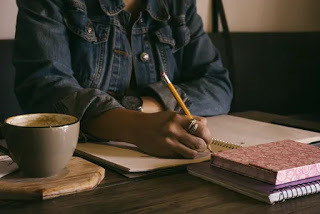 It's a habit that I developed from 2001, back when I was working as an extremely underpaid and overworked civil servant, scribbling in my notebook during breaks and on the longish bus journey to and from the office. Frankly, there were days when being able to dip into my imaginary world whenever I had a spare moment was the only reason I managed to keep my grip on reality in this one, and this being before smartphones or tablets (because I am ancient, kids), writing in longhand was my only option.
It's a habit that I developed from 2001, back when I was working as an extremely underpaid and overworked civil servant, scribbling in my notebook during breaks and on the longish bus journey to and from the office. Frankly, there were days when being able to dip into my imaginary world whenever I had a spare moment was the only reason I managed to keep my grip on reality in this one, and this being before smartphones or tablets (because I am ancient, kids), writing in longhand was my only option. In 2010 I became a full-time carer for my father - who relied on me to administer his haemodialysis - and decided to try and speed up my writing process by hauling my laptop with me while I was looking after him, and drafting directly into a Word doc. This was a huge mistake: swiftly capturing all my darting thoughts in the form of scribbles and then transcribing those handwritten scribbles into the screen, editing and rethinking along the way, turned out to be a massive part of my drafting process. Without it, the 'first draft' that I produced was a complete mess, painful to read even for me, and torture to edit. I learned my lesson and have been a hardcore notebook collector ever since.
However, there's a downside to writing by hand for hours everyday, and that downside is Repetitive Strain Injury. In order to combat this, I usually write either with a fountain pen (nothing fancy - I lose them too often for that) or a brush pen, as they don't require a strong grip or much pressure to work. I also utilise the Pomodoro Technique, which basically requires that you work flat-out for short periods of time with no interruptions, then take a short break, then work again.
I try to do four thirty-minute writing springs in the morning (with a five minute break between to bathe my hands in warm water and gently stretch them, as well as to visit the bathroom, refresh my drink, or chuck a toy for my dog) before breaking to take the dog for his mid-day walk and have some lunch. Then, in the afternoon, I re-read and edit everything I typed up the day before, and finally type up my newest scribbles. This technique can yield between 600-6000 words in a day (my record was 9000 words in a day, but my writing hand swelled up and became intensely painful for weeks afterward, and, as above, I learned my lesson and don't push it anymore) and it effectively means that the completed 'first draft' of my novel is actually more like the third or fourth draft.
I'm also a hardcore researcher.
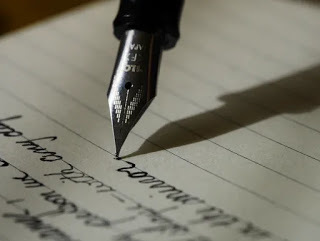
Most of my novels have been inspired in one way or another by elements of the real world - a setting/landscape, a culture, a piece of folklore or mythology or history. When I get an idea for a story that really grabs me (generally when several tiny idea fragments that have been floating around in my head for a while suddenly collide and become one Big Idea) I pick out one of my extensive collection of notebooks, something that feels like it would suit the main character to use, and label it with the date and my working title.
Then I start reading. First, I'll use the internet - yes, including Wiki - to figure out how much I don't know, which is usually A LOT. Then I'll start visiting all of the local libraries I can get to in order to borrow or order any and every book relating to my story that I can. These might be books, for instance, on the architecture and art of Edo era Japan, or on the landscape and wildlife of Northern India and Tibet, or every version of the Beauty & the Beast story throughout world history. Once I've munched my way through every book that I can get my hands on for free, I will start ordering the ones I a) feel I can't live without and b) can manage to afford on my budget. I'll also start ordering or streaming any documentaries, drama series, music, films, cooking shows, art history programmes... anything related to my research topic.
If I can afford it (which is sadly not always the case) this is also the stage where I will arrange a research trip or too, to scout out possible locations and take photos, or visit museums or exhibits.
My aim is to immerse myself so completely that I feel like I'm walking around in a cloud of information 24hrs a day. If possible, I want to be *dreaming* about this stuff. And through it all, I'll be writing ideas and information and key details down in the back of my notebook (starting with the last page and working forwards).
At a certain point, I'll feel this sort of internal 'click' and know that my research has reached critical mass and it's time to start writing. This doesn't mean I stop researching or that I know every detail that I'll need to know; it's more that I know enough to start, and I also know that if I don't start at this point, the fragile framework of the story might begin to collapse under the weight of all the facts and figures. Basically, writing is now the full-time job, not research. Once I start drafting/scribbling, I switch to writing in the *front* of the notebook (like a normal person) but I still make research notes or put down ideas for future scenes in the back. When drafting and research meet in the middle, it's time for a new notebook. On average I go through two to three notebooks, as well as a couple of 'refill' pads of paper per book.
For insight into how I make the choices that will turn my ideas about a story and characters into a coherent plot, you can listen to this podcast over on the RLF website (my section starts at about the 15min mark), or read this three-part blog series from my archive. This is actually the step that I struggle with the most, so it's the thing I've talked about the most extensively.
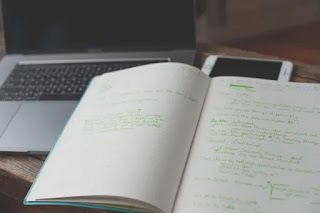
I'm generally a linear drafter.
I start at the beginning of a story - what will be the prologue or first chapter for the reader - and work my way through until I get to The End. That's not to say that I'm never struck by blinding inspiration about a scene that's chapters away, or that I don't write those scenes down. It's just that, once I've written it, it'll stay in scribbled form in the back of my notebook until I've worked my way forward in the story to that point, at which point I'll type it up. So far, at least, I've never felt the need to write a whole book, or even most of it, out of sequence, and then put it all together afterwards. It can take me anywhere between six months and eighteen months (again, so far!) to complete a 'first draft'.
When it comes to editing, I start by going back to pen and paper. Here's an archive post that basically covers the process - but I'll note here that 'optional extra' I mentioned back then, of completely changing the format of the document before I print it out? Is now one of the most vital steps. It actually makes a massive difference to me, because by the time I've completed that draft I've often been staring at certain parts of it for months on end and I've stopped being able to distinguish between 'head story' (which is what I meant to say) and 'page story' (which is what the words arranged on the page actually convey to a reader). I know where every word, comma and piece of dialogue are *supposed to be* on the page, which means I don't notice what is *really there*, even if there are missing words or I've copied and pasted something random in. By rearranging all those words, commas and formating choices, I make it much easier to come back to the manuscript with a genuinely fresh eye.

I like to change the portrait format of the document to landscape and then set the text into two columns so that it resembles the page layout that I'll often get from a copy-editor/proofreader.
Then I amend my line spacing (from double to single) and reset the font (from Times New Roman into something that's sans serif, like Calibri) and the text size (from 12 pt down to 11 pt, uusually).
Coincidentally, these changes can also potentially save me a chunk of paper in the printing, bringing a 300 page ms down to around 150 (yes, it's that dramatic).
So that's my (current) writing process. And that's also where I'll leave today's post. I hope that it was useful or at least interesting, AS - and anyone else who is reading. Do you have a writing process, or are you still experimenting? Do you have any tips or tricks to share? If so, sound off in the comments, and in the meantime, have a great week, muffins!
August 3, 2020
WHAT I'VE BEEN READING LATELY
First up: THE BOOK OF SNOW & SILENCE is on a Kindle Countdown deal right now and you can snap it up for under £2, but only for today - then the price increases by £1 (although that's still £1 off the normal price). So if you're interested in owning it, now is the time to snap it up.
Today I bring you a veritable blizzard of reviews, all of books I've read pretty recently. I was on a major fiction-reading slump while working on my dissertation - mainly because I spent all my time devouring academic books to try and prove that the point I'm arguing in my essay isn't utterly bonkers - but now that it's finished and I'm nearly ready to hand in, I've gone... a bit book-mad. I just had a lot of novels queued up on my ereader, and once I started, I couldn't stop!
Some of these reviews are looong. Some are short and sweet. There's no way I can copy and paste all of them here in full, so I'm just going to list the books with a one sentence summming up, and a link to the full thing over on Goodreads. These are presented to you in reading order, not order of preference, and I'm only sharing reviews for standalone books.
A Warning: I do not hold back on expressing my feelings, here! If I inadvertantly trashed your favourite book, I apologise for any hurt feelings - but just know that however negative my review may seem, I myself have been the recipient of ones ten times worse, and survived. Also, although I may refer to the authors, I will always focus on the book or character's traits, not the writers' (presumed) ones.
Onward!
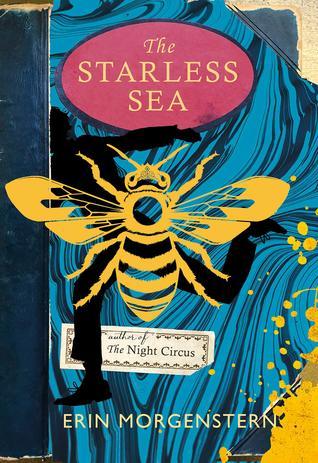
The Starless Sea by Erin Morgenstern. Finished: the 28th of June. My Summary: gorgeous but incoherent and ultimately unsuccessful. Full review.
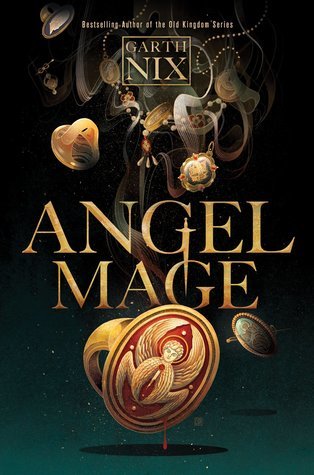
Angel Mage by Garth Nix. Finished: the 4th of July. My Summary: Enjoyable mash-up of fun elements that left me feeling somewhat let down by the close. Full review.
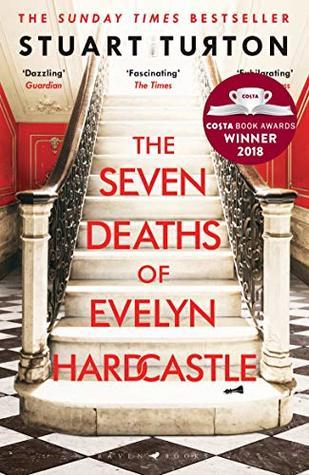
The Seven Deaths of Evelyn Hardcastle by Stuart Turton. Finished: the 13th of July. My Summary: an intriguing take on the well-worn Groundhog Day trope which has a lukewarm start, a bubbling-hot middle, and then goes off the boil at the end. Full review.
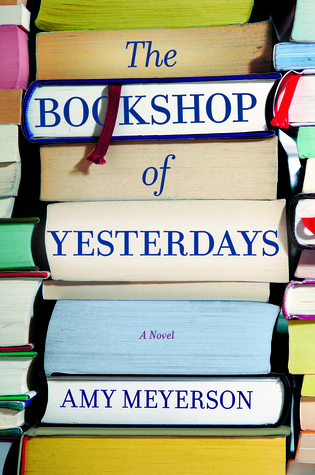
The Bookshop of Yesterdays by Amy Meyerson. Finished: July the 30th. My Summary: I went in looking for a whimsical, life-affirming, bibliophile-friendly tale, but I got uninteresting family drama and a heroine so miserable and dense that it was a struggle to finish. Full Review.
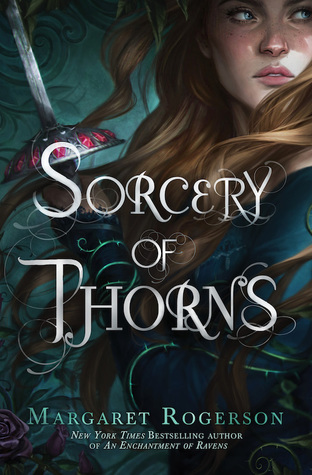
Sorcery of Thorns by Margeret Rogerson. Finished: July the 29th. My Summary: Fast-paced, thrilling fantasy which is vaguely reciminiscent of my favourite bits of LIRAEL by Garth Nix and has an ending which is Just Right. Full Review.
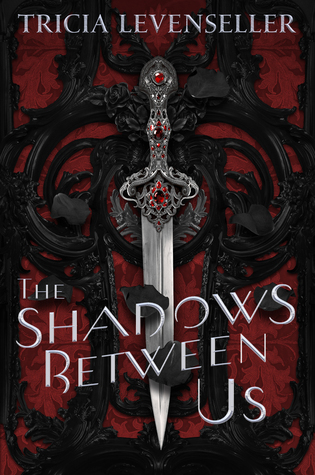
The Shadows Between Us by Tricia Levenseller. Finished: July the 31st. My Summary: A brilliant premise sadly wasted because the characters are unbearably shallow and boring. Full review.
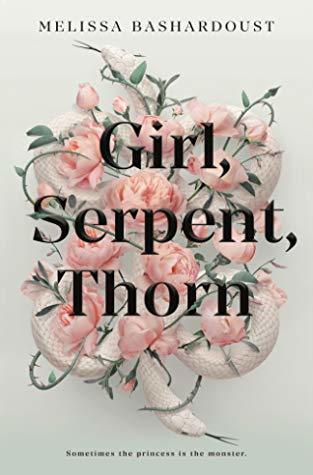
Girl, Serpent, Thorn by Melissa Bashardoust. Finished: August the 1st. My Summary: A twisty fantasy which offers Persian inspired mythology and worldbuilding and characters that absolutely scintillate with inner life. Full Review.
Let me know if you've read any of these (or plan to) and what you thought in the comments, Muffins!
July 27, 2020
CAMP NaNoWriMo 2020 - I WON!

Kind of speaks for itself, doesn't it? Whooop!
Yes, I managed to get the most super special secret project ever (should I start just calling this TMSSSPE? Or maybe come up with a codename?) to 30,000 on Monday last week, which completed the challenge I set myself for Camp NaNo this year.
Honestly, it was a massive relief, and I nearly cried with the sheer release of anxiety over getting there. Trying to work on the WIP from 9:30 to 13:30 every day AND rewrite my thesis proposal AND edit my dissertation essay AND read and offer detailed feedback on the work of twenty-four students every week AND find time to, you know, adult (walk my dog adequately, exercise every day, eat something approaching healthy food and prevent my house from turning into a black hole inhabited only by person-sized sentient dust bunnies, warring clans of silverfish and a slowly decaying TBR pile the size of a Welsh mountain) was starting to make me go a bit frazzled. And sure, I could have given up, but having managed an unbroken streak of 20 days of writing made my competitive streak burn to life and I just couldn't make myself do it.
If you're thinking that it may have been a bit overly ambitious to decide to do Camp NaNo during what is apparently already an incredibly busy period - yes, you are right. But on the other hand, it accomplished what NaNo is intended to accomplish, which was getting me to that target. And I knew without some kind of motivation, even if only my own competitive streak, TMSSSPE (codename: Times Pee? That definitely doesn't work, does it?) would almost certainly have stalled completely in July, which I didn't want.
So I'm not mad. I might even try Camp NaNo again next year, provided I have slightly more breathing room in July 2021.
(Please do not cause me to be cursed in some inventive fashion, discover I am really a troll princess in the middle of a troll civil war, or send a flying house to crush me during July next year, universe - it would not be funny, just mean. Thank you very much)
I'll be popping the WIP on the back-burner for a couple of weeks to give myself space for everything else. I don't really want to: I'm still loving it. But it's the only thing that doesn't have any deadlines or contractual obligations attached to it just now. And I'm still researching and scribbling down notes as they occur to me.
Are you still pressing your noses to the NaNo grindstone - or other grindstone - muffins? And do you have any suggestions for a codename for TMSSSPE? Let me know in the comments!



